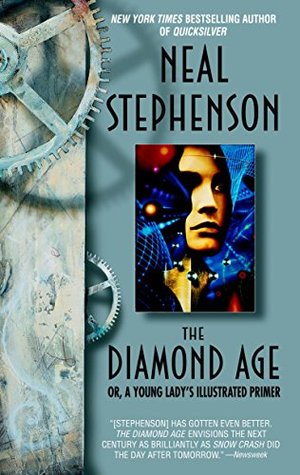Otis Chandler's Reviews > The Diamond Age
The Diamond Age
by

by

Otis Chandler's review
bookshelves: sci-fi, fiction, steampunk, adventure, cyberpunk, nanotechnology
May 21, 2011
bookshelves: sci-fi, fiction, steampunk, adventure, cyberpunk, nanotechnology
I first read this ~10 years ago and just re-read it as someone reminded me that it predicts the future of reading. And it does - what I love about Stephenson is his high level of prescient-ness. In fact I think it also predicts a lot of the future of nanotechnology and entertainment.
The Young Ladies Illustrated Primer is a dynamic book with an AI in it. Imagine Alexa or Siri in 5-10 years, smart enough to make up stories on the fly and answer questions about or even redirect the storyline. The YLIP is designed in the book for a 4 year old girl, Fiona, but Nell and a few other girls end up with them also. Maybe this resonated with me as I have a 4 year old girl and wish this existed for her. What's particularly powerful about this, is the story was able to be adaptive to the problems in Nell's life, and give her strength and confidence at moments when she needed it. Some cool trivia: Project Fiona was the codename for the Kindle. There is now a building at Amazon in Seattle named Fiona.
One of the pieces of magic of the Young Ladies Illustrated Primer was that for Nell and Fiona's editions, there were live actors ("ractors") on the other end, reading all the lines 1 on 1. This put a level of personalization and human connection into the story for the girls that wouldn't have been possible otherwise. Learning about the marketplace of ractors was particularly interesting and it's hard to think such a thing won't exist in 2-5 years as VR takes off. Would you rather watch the movie Harry Potter or live act out the scenes with 2 friends as Harry, Ron, and Hermione, and have professional actors play the other characters? You can imagine this being a big form of entertainment of the future.
The nanotechnology described in the book was also fascinating. Describing a world of robots and drones too small for the human eye to see, doing tasks and even fighting each other. Massive wars we perceive as "particularly dusty days". Poisoning or taking control of another person is as easy as getting them to inhale or injest some nanobots. The drummers were a particularly interesting notion of hive-mind, connecting multiple humans together through nanobots attached to their synapses on their brain. And then of course you have nanobots creating other bots, which led to this great quote:
"The Victorian system used Darwinian techniques to create killers adapted to their prey, which was elegant and effective but led to the creation of killers that were simply too bizarre to have been thought up by humans, just as humans designing a world never would have thought up the naked mole rat."
But of course the biggest implication of nanotechnology is the ability to manipulate molecules and thus - given The Feed (which I somehow provides a stream of molecules & energy for manipulation) - you can make anything in a Matter Compiler (MC). This is kind of like what they had in Star Trek, and what 3D printing gives us .0001% of today.
The book is largely about what would happen to society if MC's were invented and much of the need for farming, manufacturing, etc was eliminated. Poverty would become even more prevalent, as would crime, governments would collapse, and of course, a class divide would emerge as never before, driven by those who have technology and those who don't. And of course, badass engineers like Hackworth will rule the day (kind of). I suppose in a way the book is about the fear of what will happen if technology progresses too far and leaves masses of humans without a purpose in life. Parking lots and chaos.
“These were rice paddies before they were parking lots. Rice was the basis for our society. Peasants planted the seeds and had highest status in the Confucian hierarchy. As the Master said, “Let the producers be many and the consumers few.' When the Feed came in from Atlantis, from Nippon, we no longer had to plant, because the rice now came from the matter compiler. It was the destruction of our society. When our society was based upon planting, it could truly be said, as the Master did, “Virtue is the root; wealth is the result.' But under the Western ti, wealth comes not from virtue but from cleverness. So the filial relationships became deranged. Chaos,” Dr. X said regretfully, then looked up from his tea and nodded out the window. “Parking lots and chaos.”
The Young Ladies Illustrated Primer is a dynamic book with an AI in it. Imagine Alexa or Siri in 5-10 years, smart enough to make up stories on the fly and answer questions about or even redirect the storyline. The YLIP is designed in the book for a 4 year old girl, Fiona, but Nell and a few other girls end up with them also. Maybe this resonated with me as I have a 4 year old girl and wish this existed for her. What's particularly powerful about this, is the story was able to be adaptive to the problems in Nell's life, and give her strength and confidence at moments when she needed it. Some cool trivia: Project Fiona was the codename for the Kindle. There is now a building at Amazon in Seattle named Fiona.
One of the pieces of magic of the Young Ladies Illustrated Primer was that for Nell and Fiona's editions, there were live actors ("ractors") on the other end, reading all the lines 1 on 1. This put a level of personalization and human connection into the story for the girls that wouldn't have been possible otherwise. Learning about the marketplace of ractors was particularly interesting and it's hard to think such a thing won't exist in 2-5 years as VR takes off. Would you rather watch the movie Harry Potter or live act out the scenes with 2 friends as Harry, Ron, and Hermione, and have professional actors play the other characters? You can imagine this being a big form of entertainment of the future.
The nanotechnology described in the book was also fascinating. Describing a world of robots and drones too small for the human eye to see, doing tasks and even fighting each other. Massive wars we perceive as "particularly dusty days". Poisoning or taking control of another person is as easy as getting them to inhale or injest some nanobots. The drummers were a particularly interesting notion of hive-mind, connecting multiple humans together through nanobots attached to their synapses on their brain. And then of course you have nanobots creating other bots, which led to this great quote:
"The Victorian system used Darwinian techniques to create killers adapted to their prey, which was elegant and effective but led to the creation of killers that were simply too bizarre to have been thought up by humans, just as humans designing a world never would have thought up the naked mole rat."
But of course the biggest implication of nanotechnology is the ability to manipulate molecules and thus - given The Feed (which I somehow provides a stream of molecules & energy for manipulation) - you can make anything in a Matter Compiler (MC). This is kind of like what they had in Star Trek, and what 3D printing gives us .0001% of today.
The book is largely about what would happen to society if MC's were invented and much of the need for farming, manufacturing, etc was eliminated. Poverty would become even more prevalent, as would crime, governments would collapse, and of course, a class divide would emerge as never before, driven by those who have technology and those who don't. And of course, badass engineers like Hackworth will rule the day (kind of). I suppose in a way the book is about the fear of what will happen if technology progresses too far and leaves masses of humans without a purpose in life. Parking lots and chaos.
“These were rice paddies before they were parking lots. Rice was the basis for our society. Peasants planted the seeds and had highest status in the Confucian hierarchy. As the Master said, “Let the producers be many and the consumers few.' When the Feed came in from Atlantis, from Nippon, we no longer had to plant, because the rice now came from the matter compiler. It was the destruction of our society. When our society was based upon planting, it could truly be said, as the Master did, “Virtue is the root; wealth is the result.' But under the Western ti, wealth comes not from virtue but from cleverness. So the filial relationships became deranged. Chaos,” Dr. X said regretfully, then looked up from his tea and nodded out the window. “Parking lots and chaos.”
Sign into Goodreads to see if any of your friends have read
The Diamond Age.
Sign In »
Quotes Otis Liked

“Nell," the Constable continued, indicating through his tone of voice that the lesson was concluding, "the difference between ignorant and educated people is that the latter know more facts. But that has nothing to do with whether they are stupid or intelligent. The difference between stupid and intelligent people—and this is true whether or not they are well-educated—is that intelligent people can handle subtlety. They are not baffled by ambiguous or even contradictory situations—in fact, they expect them and are apt to become suspicious when things seem overly straightforward.”
― The Diamond Age: Or, a Young Lady's Illustrated Primer
― The Diamond Age: Or, a Young Lady's Illustrated Primer

“These were rice paddies before they were parking lots. Rice was the basis for our society. Peasants planted the seeds and had highest status in the Confucian hierarchy. As the Master said, “Let the producers be many and the consumers few.' When the Feed came in from Atlantis, from Nippon, we no longer had to plant, because the rice now came from the matter compiler. It was the destruction of our society. When our society was based upon planting, it could truly be said, as the Master did, “Virtue is the root; wealth is the result.' But under the Western ti, wealth comes not from virtue but from cleverness. So the filial relationships became deranged. Chaos,” Dr. X said regretfully, then looked up from his tea and nodded out the window. “Parking lots and chaos.”
― The Diamond Age: Or, a Young Lady's Illustrated Primer
― The Diamond Age: Or, a Young Lady's Illustrated Primer
Reading Progress
May 21, 2011
– Shelved
May 21, 2011
– Shelved as:
sci-fi
October 21, 2013
– Shelved as:
to-read
February 19, 2016
–
Started Reading
March 4, 2016
–
26.0%
March 10, 2016
–
55.0%
March 16, 2016
–
72.0%
March 19, 2016
–
81.0%
March 29, 2016
–
100.0%
March 29, 2016
– Shelved as:
fiction
March 29, 2016
– Shelved as:
steampunk
March 29, 2016
– Shelved as:
adventure
March 29, 2016
– Shelved as:
cyberpunk
March 29, 2016
– Shelved as:
nanotechnology
March 29, 2016
–
Finished Reading
Comments Showing 1-3 of 3 (3 new)
date newest »
newest »
 newest »
newest »





I've not read the book, so I can't speak authoritatively on its subject matter, but if that's the big takeaway, I'm pretty disappointed in Stephenson for espousing such a Luddite view of reality while profiting from the technophilia of his (mostly young, tech-savvy) readers.